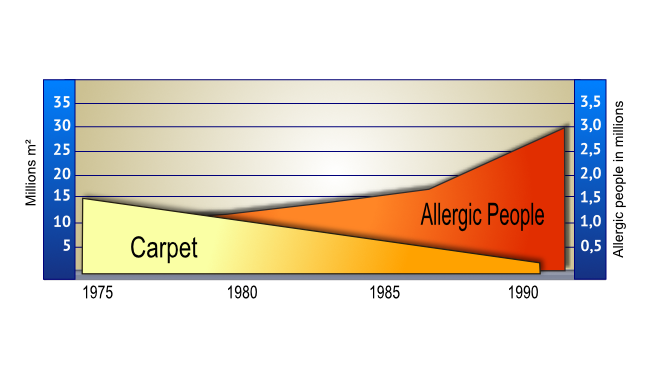Allergies
and textile floor coverings
Allergies and respiratory diseases have been on the increase for many decades with approximately 25% of the European population being affected to some extent. This number continues to grow steadily, partly as we spend a large part of our lives indoors where we breathe in more particles than we would generally outdoors.
What are allergies?
An allergy is an overreaction of the immune system to a range of substances. The general belief is that most allergies are a reaction to a synthetic substance (i.e. a chemical), however, it is more usually a reaction to natural substances such as pollen, food, animal hair (dogs, cats or horses), or a specific allergy to something like a bee sting.
How do allergies arise?
An allergy can develop from a number of causes and over a period of time. Recent scientific studies suggest that as a complex disease, an allergy can be caused initially for a variety of reasons; including, excessive hygiene, the frequent use of antibiotics, modern sealed housing, new eating habits, foods and diets, air pollution, genetic predisposition, and an increased exposure to indoor allergens.
What are the advantages of textile floor coverings?


The Swedish paradox
In the 1970s, many textile floor coverings in Sweden were replaced by hard floors. This was due to an increasing amount of allergic respiratory diseases being reported and the assumption was made that it was carpets which were to blame as it was thought that they increased the exposure of dust mites and their allergens to households.
However, the preferred habitat of dust mites are beds and upholstered furniture which provide the ideal living conditions (temperature and humidity), and not the carpet as previously thought. This is confirmed by studies which have compared rooms with beds and upholstered furniture to typical offices and measured the number of dust mites present in each case. Offices consistently have significantly lower incidences of dust mites present.
These studies have all demonstrated that despite the continuing use of hard floors out of preference during the 1980’s and 1990’s in Sweden, the use of carpets was not the cause of the increase in allergies. In fact, the number of allergic diseases continues to increase across the country despite the fact that the use of textile floor coverings is virtually non-existent. Carpets ‘capture’ much of the fine dust and other allergens within the surface pile and therefore significantly reduce particle concentration in the air we breathe.
Providing that the textile floor covering is regularly cleaned and vacuumed with equipment which has a Hepa filter, they are perfectly suitable for use by allergy sufferers.